If you fill out the "Forgot Password" form but don't get an email to reset your password within 5-10 minutes, please email logistics@ire.org for assistance.
As part of IRE's 50th anniversary and spring member drive, we’re sharing some of the biggest moments in investigative journalism since 1975.
(April 15, 2025) — When most people think of investigative journalism, they think of “Spotlight.”
The biopic follows The Boston Globe’s investigative unit as it uncovers decades of sex abuse by priests of the Roman Catholic Archdiocese of Boston and how church leaders covered it up. The original newspaper series was published more than 20 years ago, by reporters Matt Carroll, Sacha Pfeiffer, Michael Rezendes and editor Walter V. Robinson.
How did a team of journalists expose an institution as renowned and secretive as the Catholic Church?
“The Catholic Church was an unconventional target for the Spotlight Team,” Sacha Pfeiffer wrote for The IRE Journal in 2003. “For much of its (history), Spotlight had carried out its mission of exposing corruption by taking on municipal and government institutions, like bad cops, crooked politicians and corrupt public agencies.
At the same time, newspapers across the country had been writing stories for years about clergy sex abuse … but most of those stories focused on isolated cases of abuse, and on the actions of individual priests rather than church officials.”
But in 2001, when newly-named editor Martin Baron arrived at the Globe, he carried with him a story by Globe columnist Eileen McNamara that said records in a child sex abuse lawsuit against Cardinal law and other church officials had been sealed by a judge. If the case were settled out of court, common practice at the time, the records would “never see the light of day.”
Baron asked the Spotlight Team to investigate, and asked the Globe’s attorney to assess the chances of overturning the judge’s order. The Catholic Church would never be the same.
The Spotlight team spent months researching the Boston archdiocese, interviewing victims, and digging through church records and directories. The newspaper’s legal arm fought to get those court documents unsealed. Their first story, “Church allowed abuse by priest for years” (2002) made an unprecedented impact in Boston and beyond.
Rezendes reflected on the series for Spotlight’s 50 year anniversary, telling The Globe in 2021 that they were expecting protests when the story was published. They were surprised when, instead, they were met with an outpouring of calls from readers and other victims.
“It was like a dam bursting,” Rezendes said. “Suddenly, all these victims realized, ‘Hey, I’m not the only one.’ What happened in Boston that week reverberated around the world, with literally tens of thousands of victims coming forward.”
Pfeiffer explained the team’s reporting process and her shared her reflections in The IRE Journal, writing in 2003:
“The story has been a refreshing reminder that newspapers should not shy away from questioning even society’s most revered institutions. It also has renewed our belief that there are always ways to extract information from seemingly impenetrable institutions.
Throughout this project, our extensive contact with victims has demonstrated the immense value of reaching out to readers, who are often rich repositories of information. And our investigation has taught us that there is no substitute for documents to prove a case of this magnitude. In the end, the church’s own files were its downfall, and the Globe’s decision to go to court to unseal them was worth the resources it took to do so. Other newspapers would be well-served to do the same.”
Read Sacha Pfeiffer’s IRE Journal column here.
The article has been made publicly available from the IRE Resource Center, which is home to thousands of journalism tipsheets, stories, audio recordings and other resources to help enhance your reporting. The Resource Center is available for free to IRE members, and it's just one of our many member benefits!
Learn more about member benefits and join IRE today.
(April 11, 2025) — Investigative Reporters and Editors has a longstanding history of teaching journalists and students across the country. Along with planning our own events, our training team and longtime members also teach at conferences hosted by our partner organizations.
“This outreach helps reinforce our belief in collaboration and that all journalists can use watchdog techniques in their work,” said Francisco Vara-Orta, IRE’s Director of Diversity and Inclusion. “We’re grateful to our partners for opening their doors to us and always welcome them at our events in the spirit of collaboration, especially as we all collectively strive to help journalists do better work.”
So far this year, IRE staff and members serving as guest speaking ambassadors have attended the World Journalists Conference in Seoul, the Religion News Association and SABEW Conferences in Washington, D.C., and the SPJ Region 8 Conference in Texas.
Here’s where else IRE will be throughout 2025:
Jeff German Investigative Workshop | April 11-12
IRE is partnering with Weber State University to host the Jeff German Investigative Workshop April 11-12. We’re bringing in speakers from Salt Lake Tribune, FOX 13 Utah, and other local newsrooms to teach watchdog techniques and digital security tips. The workshop honors Jeff German, a longtime IRE member and Las Vegas-Review Journal investigative reporter killed in 2022.
SEJ Conference | April 22-26
Society of Environmental Journalists is hosting their annual conference at Arizona State University. This year’s theme is “Heat, Water and Growth: Confronting the Past, Surviving the Future.” Registration is open to SEJ members, nonmembers and students. IRE will be teaching classes on mapping and data journalism with Google Sheets.
AHCJ Conference | May 29-June 1
The Association of Health Care Journalists is hosting their annual conference for journalists, health care professionals, policymakers and other experts. IRE will teach classes on accessing health data and barriers trans people experience with accessing health care. Registration is open to AHCJ members, nonmembers and students.
Last year, IRE partnered with AHCJ to host a series of webinars on investigating the business of health care.
EWA National Seminar | May 30-31
The Education Writers Association is hosting their National Seminar to help attendees cover education on the federal, state and local level. IRE will be presenting sessions on data journalism and how to cover DEI issues.
IRE Conference | June 19-22
This is IRE’s biggest conference of the year, with timely training sessions on investigative techniques and data skills, as well as celebrations for IRE’s 50th anniversary.
Registration is open to IRE members (journalists, educators and students). The early-bird rate is available through April 28, with a special discount for members who are early-career journalists, full-time freelancers or currently unemployed. Not an IRE member yet? Learn more about member benefits and join today.
MVJ25 | July 8
Military Veterans in Journalism is hosting a day of workshops and panels for veterans and military spouses in the news field. IRE will teach a session.
NAHJ Conference | July 9-12
The National Association of Hispanic Journalists is hosting their annual conference, with leading Hispanic journalists and media professionals. IRE will teach a session.
ACP College Media Mega Workshop | July 10-12
Associated Collegiate Press’ annual workshop is at the University of Minnesota’s Twin Cities campus this year. It’s geared toward collegiate journalists and advisers to prepare them for their challenges going into the academic year. IRE will teach a session.
Advanced Data Journalism Bootcamp in R | Aug. 4-8
IRE’s third in-person bootcamp of the year will focus on R. This weeklong program will teach you how to use R, a powerful, open-source programming language for cleaning, analyzing and visualizing data. We'll also discuss finding and negotiating for data, solidifying your analysis, and using numbers in your stories.
Fellowships are available to help radio and TV journalists; journalists, students and educators of color; those who identify as part of the LGBTQ+ community; and those with disabilities. Apply using IRE’s Common App by May 6. Fellowships are also available for journalists serving rural communities. Apply by May 6.
NABJ Convention | Aug. 6-10
The National Association of Black Journalists is hosting their annual convention and also celebrating their 50th anniversary. IRE will be teaching classes on public records, verifying information online and how to incorporate watchdog techniques into everyday reporting.
IJA Conference | Aug. 13-15
The Indigenous Journalists Association is hosting their annual conference to support and enhance the knowledge and skills of journalists covering Indigenous communities. IRE will be teaching classes on backgrounding and verifying information online.
In addition to these events, IRE staff will be representing at the NLGJA Convention in Atlanta (Sept. 4-7), MediaFest25 in Washington, D.C. (Oct. 15-18), and the GIJN Conference in Kuala Lumpur (Nov. 20-24).
We're also hosting our all-virtual conference, AccessFest, in October, with dates to be announced soon. This conference offers the best programming from our in-person IRE and NICAR Conferences, as well as sessions focused on diversity, equity and inclusion in the newsroom and in news coverage.
We hope to see you soon!
If you can’t make it to one of these events, IRE offers custom training options where our trainers visit your newsroom (in-person or virtually) to teach you the skills you need. We offer classes on more than 50 topics, as well as select sessions in Spanish. Explore options and book a training today.
Want to partner with IRE? Reach out to the training team at training@ire.org.
As part of IRE's 50th anniversary and spring member drive, we’re sharing some of the biggest moments in investigative journalism since 1975.
(April 8, 2025) — By the time Donald Barlett and James B. Steele published their landmark series on wealth inequality in 1991, they had already worked on a groundbreaking data project with Phil Meyer and won two Pulitzer Prizes for their investigative reporting.
But their nine-part Philadelphia Inquirer series “America: What went wrong?” was unique in that it captured — and questioned — the drastic transformation of an entire nation in real time. Barlett and Steele dug into how corporate greed and political deal-making over decades were contributing to the decline of America’s middle class.
They spoke about the series at the 1992 National Press Club luncheon.
During their remarks, Barlett noted that their colossal work started with a simple question: “What happened to the American worker?”
So, in 1989 and 1990, they traveled across the country and captured stories from a swath of middle-class Americans. A saw mill worker in Martell, California. A department store clerk in Charleston, West Virginia. A meat processing plant worker in Delia, Missouri. A middle-level manufacturing plant manager in Niles, Michigan. And on and on and on — until they noticed a pattern.
“We saw something we had never seen before in all the years in this business,” Barlett said. “The interviews were identical.”
Across the country, regardless of race, economic status, or college education, people were being increasingly forced to work lower-paying jobs, or losing their jobs altogether. They were losing health care benefits and pensions, or paying more for healthcare.
Digging into statistics helped them prove a story Americans are all too familiar with today: the country’s growing wealth gap and the shrinking middle class.
In those 1992 remarks, Steele goes on to note why the series struck a chord with readers across the country:
“It did so by using techniques and processes of journalism that supposedly nobody wants to read anymore,” Steele said. “This thing was long. 73,000 words in the original form. … It was filled with numbers. It dealt with the economy. Taxation. Fiscal policy. The federal deficit. All of these things that supposedly we hear over and over again that readers don't want to read about.”
“We believe people are capable of absorbing numbers, information of that sort,” Steele said. “But you can't just spew it out. You have to put it in some kind of a context.”
Monika Bauerlein, Chief Executive Officer of Mother Jones, reflected on the duo’s impact after the death of Barlett last year.
“When I started in journalism, smack in the middle of that early-’90s recession … Reporters exposed illegal acts, not ones that were merely unfair or inequitable,” Bauerlein wrote. “That’s what made Barlett and Steele’s reporting so unique, and so powerful. What happened to incomes in America was wrong, it was right there in the book title.
Not because it broke any laws (the point was that it was all perfectly legal!) but because it was unfair. Seeing that journalism could do that — could expose not just lawbreaking, but systemic injustice — was an aha moment for cub reporter me.”
Since the project, the duo went on to work together for more than 40 years. They also expanded on their original reporting, publishing another series with the Investigative Reporting Workshop in 2012 and an updated book, “America: What Went Wrong? The Crisis Deepens” in 2020.
After the 2012 series, they shared the following advice to journalists in an IRE contest entry:
“Try to take a long view of economic currents — not just what the latest quarterly data may show. Politicians, bureaucrats, corporate officials and special interests constantly misstate or gloss over complex issues, such as trade and taxes, by highlighting numbers that appear to support their position, when the data over the long term may give an entirely different picture. So go to the specific public documents to chart these trends for yourself. And always listen closely to people — what they see, hear or believe about the state of the economy. Quite often they have a better view of what’s going on than economists.”
The duo shared more tips for putting together an investigation at the 2009 IRE Conference in Baltimore. Listen to a recording of the session: Building the story: From getting started to knowing when to stop.
This recording has been made publicly available from the IRE Resource Center, which is home to thousands of journalism tipsheets, stories, audio recordings and other resources to help enhance your reporting. The Resource Center is available for free to IRE members, and it's just one of our many member benefits!
Learn more and join IRE today.
(April 7, 2025) — Would you like to help lead Investigative Reporters and Editors as a new member of the Board of Directors? Or help judge the IRE Awards as an elected member of the IRE Contest Committee?
Now is your chance! Six of 13 board seats are up for election in 2025, along with two seats on the Contest Committee.
The period to declare candidacy opened on April 1, and the deadline for candidates to file and submit election materials is May 6, 11:59 p.m. Central.
IRE member voting will begin June 3, and voting will close June 21. Election results will be announced the membership meeting at IRE25.
Click here to learn more about the board election process and how to run. Current membership in IRE is a requirement for all candidates.
As part of IRE's 50th anniversary and spring member drive, we’re sharing some of the biggest moments in investigative journalism since 1975.
(April 1, 2025) – Investigative journalism did not begin with Watergate, but it was a watershed moment for the field when a story about a D.C. burglary led to the resignation of a sitting president.
Len Downie Jr., an IRE founder and Watergate editor, saw the first story about the 1972 DNC headquarters break-in while he was in London for a fellowship. It didn’t scream “scandal” right away, but there was something strange unfolding. He recalled the series of events during the 2012 IRE Conference in Boston:
“I saw this odd story,” Downie said. “And I found the bylines on it odd.”
“Carl Bernstein, who had been at the paper for about as long as I had been, I was amazed he was still working there. ... And I had never heard of Bob Woodward because he had been hired while I was away on leave.”
When he returned to the newsroom, Downie played a major role in editing the Washington Post’s years-long coverage of Watergate.
Even though there was some questioning of authority during this time – especially after the Vietnam War and Pentagon Papers – Downie said political journalists were still shocked by Watergate. A conspiracy of this level seemed unfathomable.
“Within our own newsroom, there was skepticism,” Downie said. “… about what the paper was doing to itself by pursuing what looked like a silly, stupid story.”
For the next two years, they chased leads and reported on the burglary’s links to the White House and the Nixon reelection campaign, leaks from Deep Throat, the Senate Watergate hearings, the involvement of hush money and secret tapes, and the eventual resignation of President Nixon. See the timeline of events by The Washington Post.
Because of Watergate, investigative reporting became a key part of American journalism and culture.
The film depiction of Woodward and Bernstein’s book, “All the President’s Men,” emphasized the central tenets of investigative journalism: Knocking on doors. Finding documents. Following the money. Read more in Downie’s column for The Washington Post.
“The book itself is like a primer on basic reporting,” Bernstein told ABC News last year. “You see what's the most important decision we make as reporters? To go out at night and to visit people who work for Richard Nixon and his reelection in their homes, knock on their doors, have the doors you know, slammed in our faces, except for the few that didn't.”
It’s important to remember that raw perseverance of shoe-leather reporting. Woodward and Bernstein didn’t set out to oust a president; they were writing a story about a break-in that turned into so much more.
“It’s about fitting little pieces together,” Woodward told Roy J. Harris for the book Pulitzer’s Gold: A Century of Public Service Journalism. “You don’t know what you have when you publish a little piece, but you publish it anyway.”
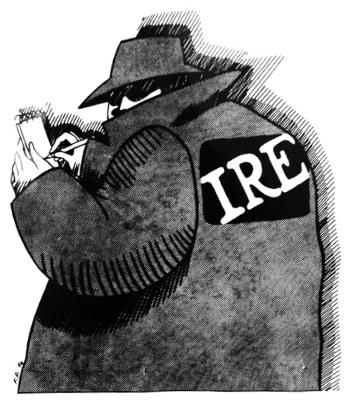
Another impact of Watergate? More journalists and news organizations wanted to pursue investigations, but they didn't necessarily have the experience. That’s where IRE comes in.
In 1975, a group came together to form a national organization embodying the mission of investigative reporting, hoping to set standards and best practices in this growing field. They included Downie, Myrta Pulliam, Paul Williams, Les Whitten, among several others.
“It dawned on people that they don’t have to reinvent the wheel,” Pulliam told The IRE Journal in 2015. “They could help themselves and each other by sharing information and techniques."
In the interview with ABC News, Woodward and Bernstein also touched on the importance of working together.
“What it demonstrates is the power of collaboration,” Woodward said. “We learn in our personal lives you never do anything alone effectively. And it's the same with journalism.”
Read the very first Watergate story here.
Listen to a recording of the conference session referenced in this story: The legacy of Watergate: A conversation with Leonard Downie Jr. (2012).
This recording has been made publicly available from the IRE Resource Center, which is home to thousands of journalism tipsheets, stories, audio recordings and other resources to help enhance your reporting. The Resource Center is available for free to IRE members, and it's just one of our many member benefits!
Learn more and join IRE today.
(March 31, 2025) – Investigative Reporters and Editors is offering a new membership perk this spring. Join or renew your membership by April 28 to receive a 50% discounted subscription to DeleteMe services – a savings of $65!
DeleteMe works to remove personal data online, which can protect journalists against digital security threats such as doxing, targeted personal harassment, phishing and fraud. More than 70 media brands, including ProPublica, Yahoo! and Pinterest, use the service for their employees, but we know all journalists don’t have access to digital safety services – even as they face doxing threats for their essential work.
“In today’s environment, digital safety is a priority for journalists,” said IRE Executive Director Diana R. Fuentes. “IRE is pleased to partner with DeleteMe to offer their vital services to our members at a special rate.”
The consumer-level service is usually $130 a year, but IRE members can sign up now for $65. This discount is valid only through IRE’s spring membership drive, March 31 - April 28, 2025.
Click here to join IRE. Click here to renew your membership. To request the discount code, members who join or renew should email membership@ire.org.
DeleteMe is the latest addition to IRE’s long list of member benefits. Other free and discounted tools for members include Tableau Desktop and Tableau Prep Builder, SmartProcure/GovSpend, PacerMonitor, FOIAEngine, NICAR-Learn, and The IRE Journal.
Members also receive free access to the world’s most extensive library of tipsheets on investigative and data journalism, as well as training webinars and virtual events throughout the year.
About IRE: Investigative Reporters and Editors is a grassroots nonprofit organization dedicated to improving the quality of investigative reporting. IRE provides training, resources and a community of support to thousands of journalists around the world. Learn more about the organization and the benefits of membership.
(March 24, 2025) – The Board of Directors will discuss a change to Article 10 of the organization’s Code of Bylaws at its April 18, 2025, meeting.
The Governance Committee will meet on April 4, 2025, and will be reviewing the proposed update to the bylaws, and will advise the Board.
Proposed Amendment:
“The Endowment Funds are monitored by a Finance Committee that is chaired by the Treasurer and includes six other members of IRE, including one Director. That Director and two of the other members are nominated by the President; the others are nominated by the Treasurer. All are nominated after the annual officer elections and must be approved by the IRE Board. One of the six nominees may be a financial professional who is not an IRE Member. The others must be IRE Members. They serve for two-year terms. The Finance Committee works on fundraising, oversees ongoing revenues and expenses, monitors the Endowment Funds and advises the Board on investment practices.”
If you have comments or questions about this proposed amendment, contact IRE’s Treasurer Mark Greenblatt (mark.greenblatt@asu.edu ) or the chair of IRE’s governance committee Sarah Cohen (sarah.h.cohen@gmail.com).
(March 18, 2025) — NICAR25 brought together more than 900 journalists, educators and students in Minneapolis!
With three-and-a-half days of programming on investigative and data journalism techniques, mapping, programming, AI and so much more, the conference is always packed to the max with practical knowledge and inspiring words of wisdom. Not to mention everything you learn outside of formal classes, by meeting and mingling with fellow colleagues and mentors.
Here are 25 things we learned at NICAR25.
1. “Your data story is not about data. It’s about people.” — Carrie Cochran, Jodie Fleischer (Cox Media Group), and Tom Scheck (APM Reports).
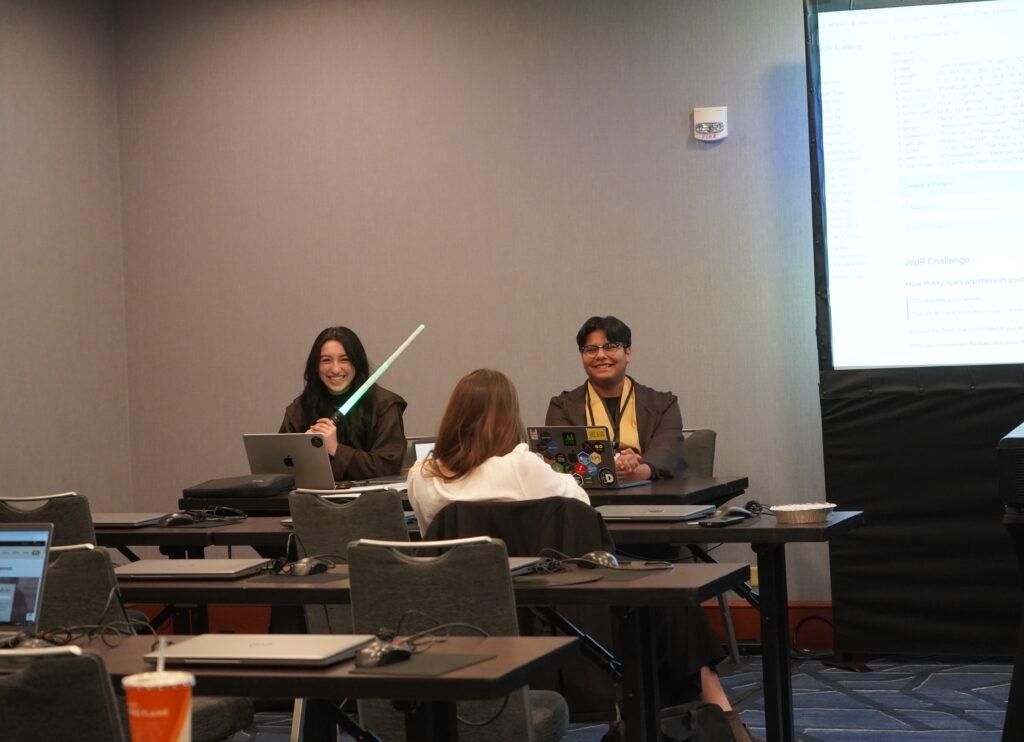
2. Data journalism on college campuses is looking strong! We had students from CUNY, Indiana University, Mizzou, UC Berkeley, University of Minnesota, Syracuse University, University of Texas at Austin — just to name a few. Some students, like Yasmin Garcia and Johan Villatoro, even taught alongside their professors.
3. So many tools are free! RECAP has free documents from PACER archive, and you can set up alerts on court cases you’re watching. Notebook LM will summarize your documents after uploading. Google Pinpoint can help with bulk document search, summarization, and extraction. Check out more time-saving tools here, thanks to Pooja Dantewadia (Realtor.com), Tyler Dukes (McClatchy Media) and Cynthia Tu (Sahan Journal).
4. “I learned how to scrape data into Google Sheets!!” — Claire Rafford, Mirror Indy
5. ”I know how to make a pivot table now” — Dené K. Dryden, The Rochester Post Bulletin

6. “I learned about tugboatinformation.com - a truly wonderful meticulous listing of every tugboat. There's a tugboat in the news in Half Moon Bay, where I live — and I found a page about it on the site! The internet is still a wonderful place.” — Simon Willison, simonwillison.net
7. Singer Bonnie Raitt loves investigative journalism! ESPN reporter Tisha Thompson gave a surprise Lightning Talk about a reporting journey that ended up with her on stage at a Bonnie Rait concert. She spoke about the power of watchdog reporting and the challenges investigative journalists face today. Raitt made a $23K donation to Investigative Reporters and Editors afterwards.
8. The last time IRE went to Minneapolis was more than 30 years ago. The IRE Conference of 1988 was held in the Twin Cities.
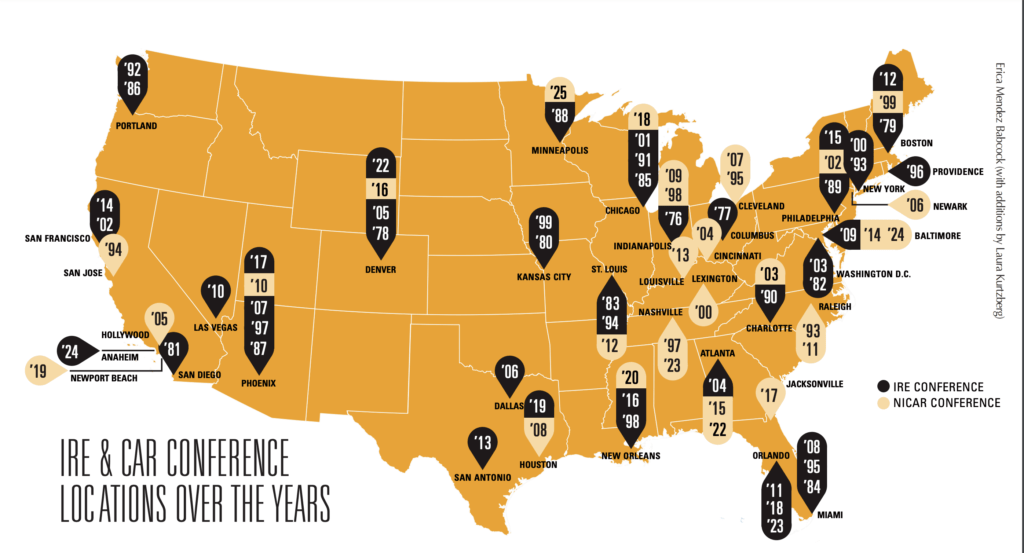
9. “Approach AI with cautious curiosity” — Mike Reilley. Check out his free newsletter Journalist’s Toolbox™ for AI tools, resources and training videos for journalists.
10. The 1996 film Fargo is based in Minneapolis. Irene Casado Sanchez, of Big Local News, was the designer of this year’s NICAR T-shirt! Check out her t-shirt, inspired by the film poster!
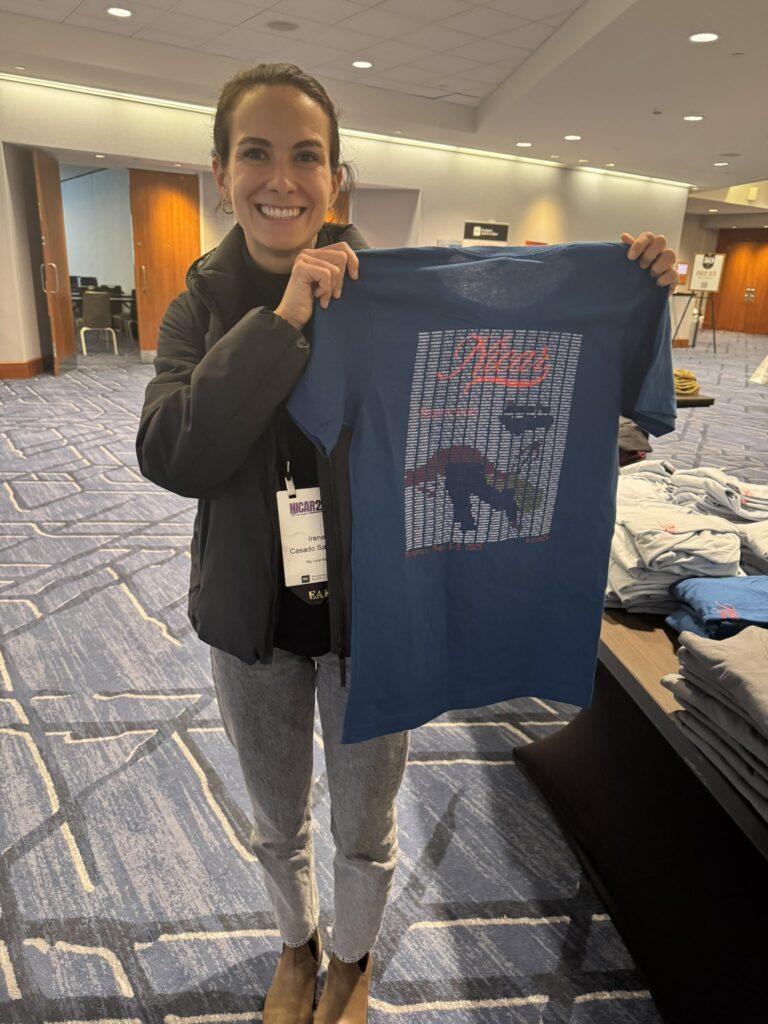
11. There are so many government datasets that can be downloaded for free as Excel or CSV files and localized to any city, county or state in the United States. Here are 50, shared by David Cuillier and Sydney Sims of the Brechner FOI Project. These datasets can help with research, story ideas, finding trends and much more.
12. NICAR stands for the National Institute of Computer-Assisted Reporting, but it’s gone through a few different name changes. At one point, it was just “CAR,” later becoming “MICAR” for its home-base at Mizzou. It officially became NICAR in 1994.
13. “I learned that there are numerous valid uses for artificial intelligence and machine learning in the newsroom. However, auditing and validating these models and their outputs is essential before publishing or further reporting. Additionally, NICAR25’s various sessions helped me realize the importance of understanding development environments before installing project-specific libraries (hopefully you can avoid cluttering your global environment like I did).” — Diego Torrealba, University of Texas at Austin
14. The difference between a hot dish and a casserole, thanks to Taylor Miller Thomas.
15. The NICAR crowd loves games! We had two nights of NIghtCAR, where attendees played board games and put together puzzles after sessions. We also hosted karaoke and a data-themed scavenger hunt!
16. “Minnesota nice” is a thing. Our local IRE friends brought coats and other warm weather gear for people from out of town.
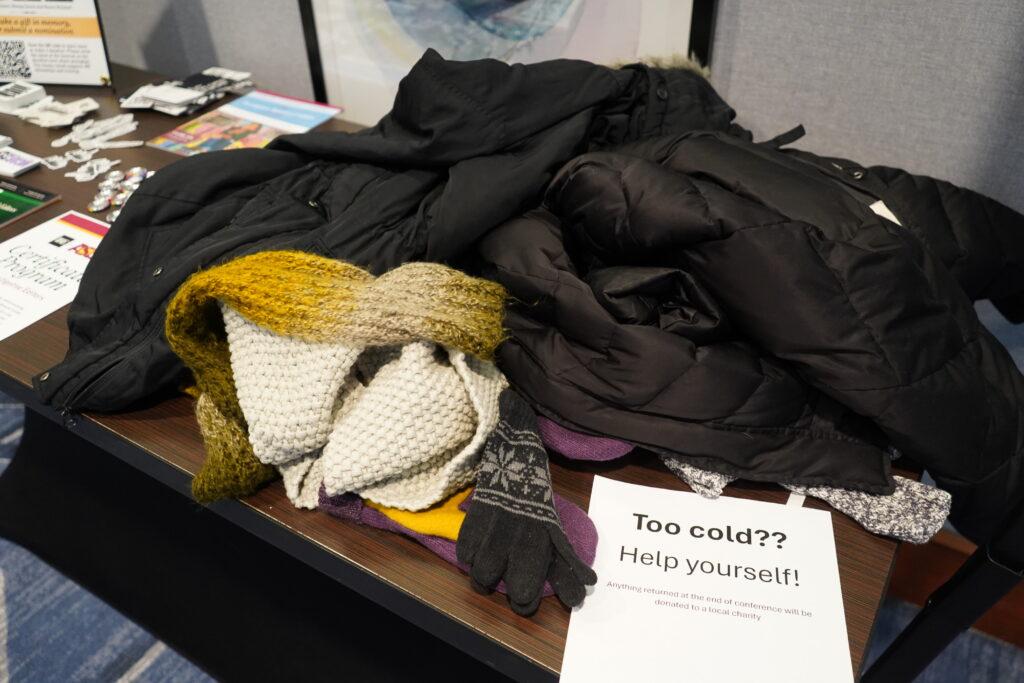
17. There are pros and cons to different languages. Carla Astudillo (Texas Tribune), Tazbia Fatima (Hearst), Nael Shiab (CBC News) and Kai Teoh (The Dallas Morning News) shared their preferences on what to use for breaking news, scraping data, building a database, and training an AI model.
18. Satellite images can help you with your investigation, and they’re not just for weather events! Sentinel 2 images from every 5 days are free and easy to download from Copernicus Browser.
19. “Learning about BillTrack50 at #NICAR25. It has both free & paid versions, & its features include allowing you to search by keyword & by state, & for similar bills. I’ve already signed up for an account. It also includes federal legislation in search results” — Becky Yerak, WSJ
20. Great investigative projects take time. “Be willing to do tedious work that others aren’t doing — like data entry to analyze 17,000+ trips taken by lawmakers paid for by private entities” — tip from Maggie Mulvihill, shared by Michael Beckel
21. Need data viz on deadline? The open source RAWGraphs web app can help with making charts and graphs, and you don’t need to sign up! Check out more time-saving tools flagged by Rowan Philp at the Global Investigative Journalism Network (GIJN).
22. IRE member Sharon Machlis has compiled tipsheets and slides from NICAR conferences since 2020!
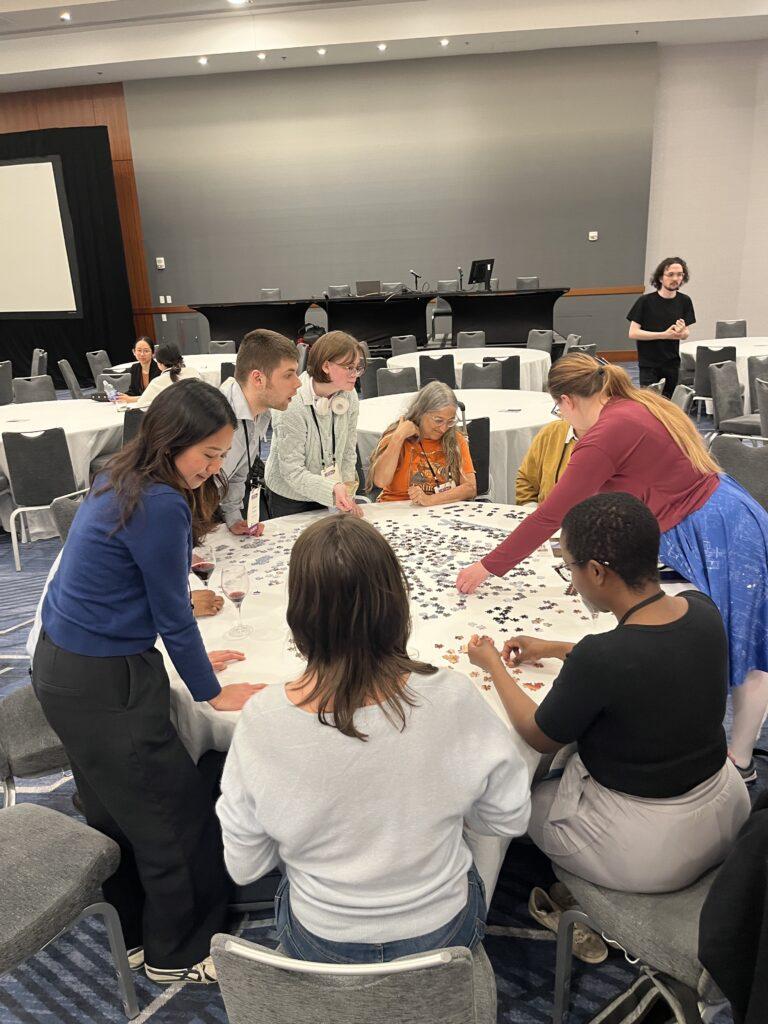
23. You’re always welcome here! “I hadn't been to a NICAR since 2018, somehow, but felt like I've never left. Best event for both practical skill-building and mission inspiration, even/especially in our current industry headwinds. And it was great to make some new friends (in the conference hallways and at the combination drag/soccer bar) and reconnect with many old ones.” — Tyler Machado, independent journalist
24. “A really lovely common thread I’m hearing at multiple #NICAR25 panels: Speakers talking about the time before they were good at what they did. We all started somewhere.” — Emily Hopkins, Mirror Indy
25. If you’re crowdsourcing for information, make sure the link to your survey is public (as we at IRE learned while putting together this blog post…). For actual tips on crowdsourcing data, see this tipsheet from Asia Fields (ProPublica), Jeremy Merrill (The Washington Post) and Leon Yin (Bloomberg News).
The NICAR Conference is IRE’s annual data journalism conference. IRE members can access tipsheets and select session recordings from the conference online. Join us next year - March 5-8, 2026 - in Indianapolis!
(March 5, 2025) — Manny García, Editor in Chief at Houston Landing, and Shawn McIntosh, Head of Standards and Practices at The Atlanta Journal-Constitution, have been nominated for the prestigious IRE Ring of Honor.
The Ring of Honor is a fundraising initiative that supports fellowships for investigative journalists and celebrates legendary current and past members of Investigative Reporters and Editors.

Both past presidents of the IRE Board of Directors, García and McIntosh are renowned standard bearers for investigative and data journalism and beloved mentors in the IRE community.
Born in Cuba and raised in Miami, García is a two-time Pulitzer Prize winner who has held leadership positions at major institutions including the Miami Herald, Nuevo Heraldo, USA Today Network and the Pro Publica-Texas Tribune Investigative Unit, among others.
McIntosh, a pioneer in computer-assisted reporting and founder of NICAR, has been at The Atlanta Journal-Constitution for more than 22 years. She also serves on the board of the Georgia First Amendment Foundation.
García and McIntosh join the late John Bones as the three nominees for the IRE Ring of Honor. Bones, known as the father of data journalism in Norway, was an IRE stalwart before his untimely death last year.
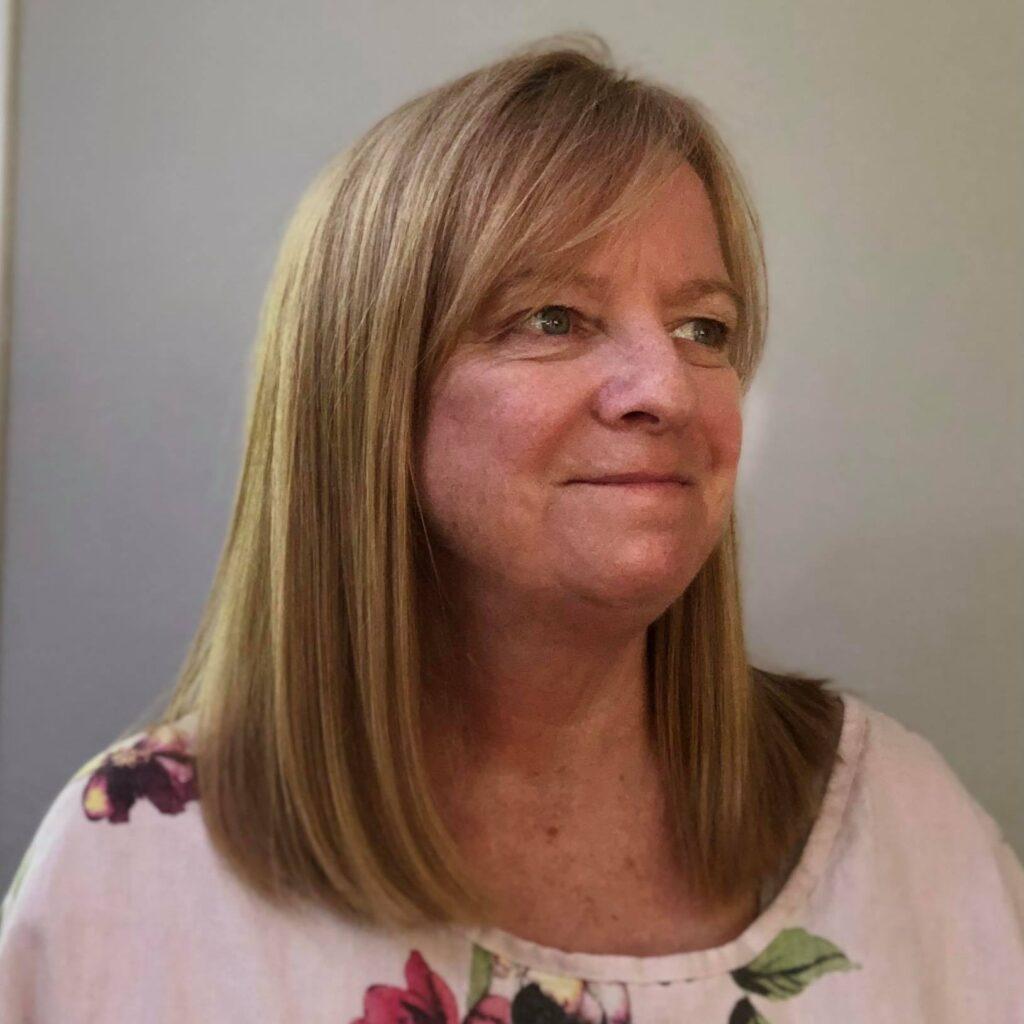
“It is fitting that in the year we are celebrating our 50th anniversary, IRE is looking at paying tribute to three of our most important firsts: John Bones, the first international IRE member nominated for the Ring of Honor; Shawn McIntosh, our first female nominee; and Manny García, the first person of color elected president of IRE,” said IRE Executive Director Diana R. Fuentes.
“Manny and Shawn continue to be active members of IRE and are admired mentors for the next generation of journalists,” Fuentes said. “We are privileged to count them among our ranks. John was taken from us too soon. He is sorely missed.”
The Ring of Honor, an initiative started in 2022, is open to current and past members of IRE. After a member is nominated for the Ring of Honor, the IRE Board of Directors reviews the nomination. If the nomination is approved, friends and family conduct a campaign to raise funds to honor the nominee. A minimum of $2,500 in donations is required to induct the nominee into the Ring of Honor.
The funds provide fellowships and help journalists and students gain access to IRE’s top-of-the-line training, resources and networking opportunities.
Bones, who was nominated in October, will be inducted into the Ring of Honor at the 2025 IRE Conference in New Orleans. You can learn more about his campaign here.
Bones was general manager of SKUP, the Norwegian counterpart of IRE, when he died of cancer May 13, 2024. He was 69. He had previously been in leadership roles at VG, the most-read daily in Norway. Bones regularly brought groups of international journalists to NICAR and the IRE Conference.
The nominations for García and McIntosh were approved at the Feb. 7 board meeting.
García served on the IRE Board of Directors from 2006 to 2014; he was elected president in 2011, serving one term. McIntosh served on the board from 1994 to 2006 and was first elected president in 2002, serving two terms.
Learn more and donate to García’s campaign here. Learn more and donate to McIntosh’s campaign here.
“All three have contributed significantly not only to our organization, but to our industry as a whole,” Fuentes said. “They helped shape investigative and data journalism as we know it today.”
The organizers of the campaigns for García and McIntosh hope to complete fundraising by June so they can be inducted at the IRE Conference in June.
Donations are tax deductible and help IRE recognize the legacy of these influential newsroom leaders while financially supporting the new wave of investigative journalists. For more information about the Ring of Honor, send an email to Anna López, IRE’s director of partnerships, at anna@ire.org.
(Feb. 24, 2025) — Today, the IRE Board of Directors issued the following statement:
For 50 years, Investigative Reporters and Editors (IRE) has worked to foster excellence in investigative journalism by providing cutting-edge training, promoting high standards and supporting a community of truthtellers.
Investigative journalism plays an essential role in society. It provides a check on power, exposing wrongdoing, saving taxpayer money and protecting the vulnerable from abuse. The ability of the media to do this work freely is not just a professional concern — it is a fundamental pillar of an informed world.
The United States government has recently taken several actions against journalists that raise serious concerns, including launching targeted investigations, blocking access to public events and threatening to cut funding that supports some investigative news organizations here and abroad.
IRE stands strongly with our colleagues around the globe. The organization is forming a working group to explore how it can help protect an independent press and access to public data.
Our training evolves as our members’ needs change. We have a variety of training resources available, including webinars and tipsheets. We are planning events on digital security and protecting your team amid other safety threats. We are also working with other journalism organizations on efforts to preserve public information, including essential data.
If you have suggestions, training requests or other ideas, please contact us at president@ire.org.

Looks like you haven't made a choice yet.